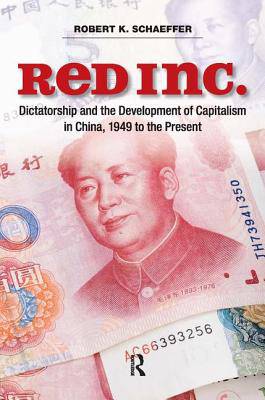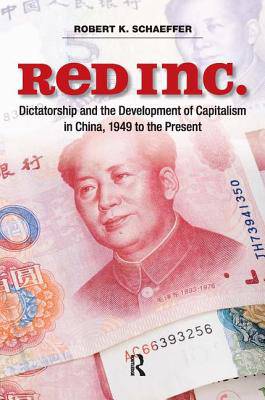
- Afhalen na 1 uur in een winkel met voorraad
- Gratis thuislevering in België vanaf € 30
- Ruim aanbod met 7 miljoen producten
- Afhalen na 1 uur in een winkel met voorraad
- Gratis thuislevering in België vanaf € 30
- Ruim aanbod met 7 miljoen producten
Zoeken
Red Inc.
Dictatorship and the Development of Capitalism in China, 1949-2009
Robert K Schaeffer
Paperback | Engels
€ 83,95
+ 167 punten
Uitvoering
Omschrijving
Red Inc. takes issue with the view that economic development will eventually promote democracy. It outlines in detail the enormous social costs of the rapid rise of China's economy. Although many observers argue that Deng Xiaoping introduced capitalism to China in the late 1970s, Schaeffer believes that capitalist development really began during the 1950s under Mao Zedong. But although Mao made relentless efforts to generate the capital needed to finance economic development, his regime failed to promote any real growth. Schaeffer shows that the remarkable rise of its economy in recent years has provided China with new and often corrupt sources of wealth and power that have enabled it to resist democracy. He brings into sharp focus the consequence of the regime's uncompromising approach to capital accumulation.
Specificaties
Betrokkenen
- Auteur(s):
- Uitgeverij:
Inhoud
- Aantal bladzijden:
- 272
- Taal:
- Engels
Eigenschappen
- Productcode (EAN):
- 9781594517129
- Verschijningsdatum:
- 28/02/2012
- Uitvoering:
- Paperback
- Formaat:
- Trade paperback (VS)
- Afmetingen:
- 153 mm x 229 mm
- Gewicht:
- 399 g

Alleen bij Standaard Boekhandel
+ 167 punten op je klantenkaart van Standaard Boekhandel
Beoordelingen
We publiceren alleen reviews die voldoen aan de voorwaarden voor reviews. Bekijk onze voorwaarden voor reviews.











